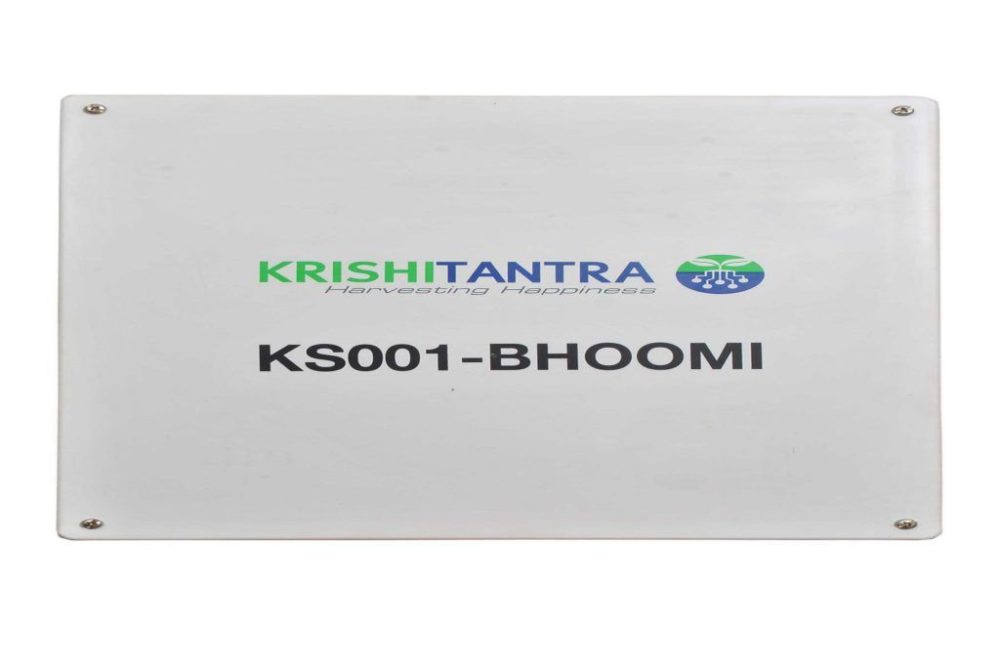Sandeep Kondaji didn’t have much experience in farming when he decided to get into soil testing. But six months working on his uncle’s farm was sufficiently frustrating for him to decide that farmers needed better tools to maintain the health of their fields.
Now, after three years working on a rapid soil testing device, Kondaji’s company Krishitantra has developed a connected widget that can produce a soil analysis report in 30 minutes. The Mangalore-based startup sells its solution to farmer collectives — known in India as ‘farmer producer organizations’ (FPOs) — agribusiness companies, and soil testing labs.
A $1 million seed funding round, backed by Mumbai-based VC firm Omnivore and NABVentures — the VC arm of India’s National Bank for Agriculture and Rural Development — will enable Krishitantra to accelerate the adoption of its testing kit and analytics services.
‘I don’t have time for that’
Kondaji, a serial entrepreneur, got the idea for Krishitantra in 2016 while taking a sabbatical on his uncle’s farm, after successfully selling another business he launched while living the Middle East. Learning the farming ropes from his uncle, it occurred to him that there wasn’t a lot of science being used to determine how much seed and fertilizer to apply during planting season. He asked his uncle why he didn’t do soil testing to more accurately and resourcefully plan how he used critical field inputs.
“He said, ‘I don’t have time for that,'” Kondaji recalls. So he took some samples himself and sent them off for testing. He quickly – or rather, slowly – came to understand why his uncle didn’t bother.
“I took the sample to the nearest government laboratory, which was not in my uncle’s village – it was about an hour-and-a-half away. When I got to the lab, I submitted the sample, they wrote down my contact details and the collection date, and asked me a few questions, and then I left,” he tells AFN.
He returned to the farm to await the results. In spite of following up numerous times, he never received them. “I don’t know what they have done with it, but there is still no report to this day.”
Kondaji then had a different sample couriered to a testing lab in Bangalore. He got the results in three days, but it cost him 1,800 rupees (about $27 at the time) – a price many Indian farmers could not regularly afford.
When Kondaji looked deeper into soil testing capacity across India, he found that it would take 10 years of round-the-clock work for existing laboratories to deliver sample readings to the country’s 130 million farmers.
Soil longevity
There are both financial and environmental consequences to India’s inadequate soil testing services. Being unable to accurately gauge fertilizer and pesticide use means farmers waste money over-applying expensive inputs, erode soil health, and contaminate other land and water sources through agricultural leaching and runoff.
In the southern state of Karnataka, one third of the available land – 3.4 million hectares – is no longer farmable due to soil erosion and toxicity, Kondaji notes.
“This has all been converted from fertile land to infertile in just the span of 20 to 30 years. If it continues to happen like this, what will happen to farmers? To the food we need to produce?” he says. “And this isn’t a challenge that only India is facing.”
Fintech startup Jai Kisan banked $3.9 million from NABVentures and other investors this year to give India’s smallholder farmers access to cheaper finance. Read more here
What Krishitantra offers is a portable, rapid-testing kit that can return an analytics report in 30 minutes. The test provides standard feedback on macro and micro-nutrients and acidity levels. It also analyzes soils’ organic and microbial composition.
“Most testing today determines only soil’s inorganic components,” Kondaji explains. This is problematic because soil is the source of robust organic ecosystems that cannot be effectively protected if they are not understood, he argues. “There are so many living beings in soil. Soil testing should be treated like a life science.”
Krishitantra takes a B2B approach, offering its testing kits via farmers’ key points of contact, like agribusinesses, testing labs. and FPOs. But along with its analytics reports, the startup offers crop-specific soil nutrition recommendations to help farmers with critical planting and growing decisions. Its immediate goal is to support optimization of fertilizer application so farmers can increase yields, reduce cultivation costs, and improve land health.
‘The first step in successful farming’
Long-term, and at scale, the company is gunning to reduce greenhouse gas emissions and promote adoption of sustainable agriculture and soil conservation practices among farmers.
Kondaji recognizes that in India, where the agricultural value chain is heavily fragmented, there are numerous challenges that need to be addressed to make the system work better for both farmers and consumers.
“But out of this entire lifecycle of farming the land until selling of the goods, the most frustrating part was that soil sample testing,” he says, because it is so fundamental to the health and productivity of individual farmers’ land – and collectively, to the wider food system.
“Proper soil management is the first step in successful farming,” Abhilash Sethi, principal at Omnivore, said in a statement. The firm chose to back Krishitantra to “democratize precision soil testing and soil nutrition” advisory services, he added.
Gills John, vice president of NABVentures, said that Krishitantra’s cost-effective, rapid soil testing “can go a long way in addressing the problem of soil fertility and encourage a shift towards precision agriculture in India.”





